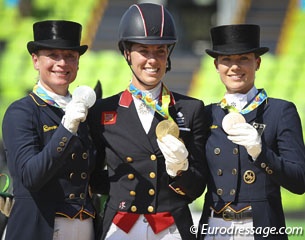
British power couple Charlotte Dujardin and Valegro proved they can samba at the 2016 Olympic Games in Rio de Janeiro, Brazil, and won their second consecutive individual gold medal by scoring 93.857% in the Kur to Music individual finals on Monday noon 15 August 2016. In a sizzling hot finals in a burning Brazilian sun, Dujardin got sandwiched by Germans Isabell Werth for silver and Kristina Bröring-Sprehe on bronze.
The highly anticipated Kur to Music Finals at the 2016 Olympic Games were a wide open game at the top with a group of at least six to seven riders with clear medal chances. In their only proper showing of 2016, here at the Olympics, Dujardin and Valegro proved they still were the ones to beat. Still the 31-year old Brit clearly lost some breathing space with the Germans marching on. Only a faultless ride would guarantee her second gold medal. And this is exactly what she did.
Valegro, a Legendary Dressage Horse, Retires from Competition with Second Individual Gold
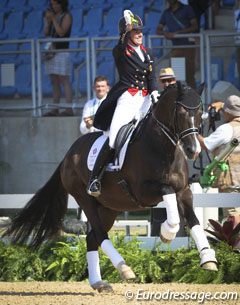 Cleverly and strategically introducing a new Tom Hunt freestyle based on samba music to appeal to the audience and judges, Dujardin commandeered the freestyle. While her test did not really bubble like champagne fizz, it was a very neat and tidy round with numerous impressive highlights and no mistakes. Valegro was lighter in the bridle and even though the poll could have been higher especially in the piaffes (in which he sways the hindquarters), the collected work was all very regular and meticulously executed. The trot and passage half passes were very controlled and quiet, the passage could have been a bit more electric. The collected walk was very clear in the 4-beat rhythm but the extended did not have the greatest overtrack. The canter work was high class with straight and uphill tempi changes and extensions, a fantastic canter half pass. Only in the final piaffe pirouette did Valegro run a bit out of steam, but overall it was a superb ride.
Cleverly and strategically introducing a new Tom Hunt freestyle based on samba music to appeal to the audience and judges, Dujardin commandeered the freestyle. While her test did not really bubble like champagne fizz, it was a very neat and tidy round with numerous impressive highlights and no mistakes. Valegro was lighter in the bridle and even though the poll could have been higher especially in the piaffes (in which he sways the hindquarters), the collected work was all very regular and meticulously executed. The trot and passage half passes were very controlled and quiet, the passage could have been a bit more electric. The collected walk was very clear in the 4-beat rhythm but the extended did not have the greatest overtrack. The canter work was high class with straight and uphill tempi changes and extensions, a fantastic canter half pass. Only in the final piaffe pirouette did Valegro run a bit out of steam, but overall it was a superb ride.
Dujardin got very emotional at the end of the test and gasped after her final salute as this was Valegro's last championship ride in his career. Her emotion was transferred to the crowd who cheered in excitement and with appreciation. It was a perfect testimony of how beautiful, harmonious dressage riding with nu pushing and pulling does appeal to a great audience, even when a majority of Brazilian leymen filled the seats to half capacity.
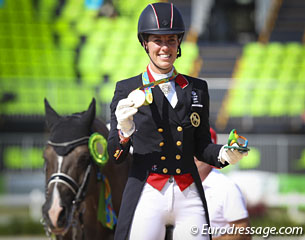 The judges' panel, consisting of Gary Rockwell, Peter Holler, Susanne Baarup, Maribel Alonso, Thomas Lang, Eddy de Wolff van Westerrode, and Stephen Clarke, rewarded the test with 93.857%, a well earned yet mildly inflated score as the 4,7% difference with the second place-getter was not realistic. The top contenders were so close together with their quality rides, that Valegro's advantage seemed a bit of a farewell gift.
The judges' panel, consisting of Gary Rockwell, Peter Holler, Susanne Baarup, Maribel Alonso, Thomas Lang, Eddy de Wolff van Westerrode, and Stephen Clarke, rewarded the test with 93.857%, a well earned yet mildly inflated score as the 4,7% difference with the second place-getter was not realistic. The top contenders were so close together with their quality rides, that Valegro's advantage seemed a bit of a farewell gift.
By winning her second Kur gold, Dujardin has now joins the elusive club of four riders to have ever won two individual Olympic gold medals: Henri St. Cyr, Nicole Uphoff and Anky van Grunsven pulled the same feat before her.
"To do it here again at the Olympics is quite special," said Dujardin at the press conferende. "Today was really magical. Going into London, I had no expectations or pressure to deliver gold. Coming here today for the first time I felt nervous and pressure to retain the title. When I trotted around the arena, Valegro gave me the most incredible feeling. That put a smile on my face, and I knew it was going to be OK.”
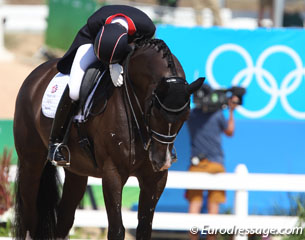 The 14-year old Dutch warmblood gelding Valegro (by Negro x Gershwin) is owned by coach Carl Hester in partnership with long-time sponsor Roly Luard. The owners' couple agreed that Valegro would be retirement at the peak of his career and the Olympics in Rio were marked as that moment, although Dujardin stated, "we haven't said when and where. It's up for discussion with Carl." Charlotte added, "he's a complete legend. To think what he has achieved. I owe it to him to finish at the top."
The 14-year old Dutch warmblood gelding Valegro (by Negro x Gershwin) is owned by coach Carl Hester in partnership with long-time sponsor Roly Luard. The owners' couple agreed that Valegro would be retirement at the peak of his career and the Olympics in Rio were marked as that moment, although Dujardin stated, "we haven't said when and where. It's up for discussion with Carl." Charlotte added, "he's a complete legend. To think what he has achieved. I owe it to him to finish at the top."
Hester told Eurodressage that Valegro will be retired from a competition career, but will stay in training and used as a horse for demonstrations. "We have 30 pony club kids coming to our yard and he's perfect around them," Hester said. Valegro will continue to inspire young people to take up horse riding and dressage.
Werth and Weihegold Stunt for Silver
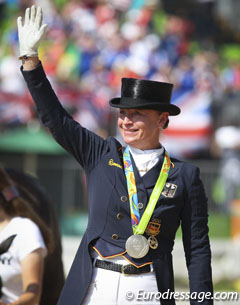 German Isabell Werth had her war face on in the freestyle. It read total concentration and she pulled out all the stops aboard Christine Arns-Krogman's 11-year old Oldenburg mare Weihegold (by Don Schufro x Sandro Hit). While her music sounded more like a background jingle, it only started to touch a nerve and match music with movement in the canter work in which Werth rode a very strong combination of two tempi changes, double pirouettes, extended canter, double pirouettes and one tempi changes.
German Isabell Werth had her war face on in the freestyle. It read total concentration and she pulled out all the stops aboard Christine Arns-Krogman's 11-year old Oldenburg mare Weihegold (by Don Schufro x Sandro Hit). While her music sounded more like a background jingle, it only started to touch a nerve and match music with movement in the canter work in which Werth rode a very strong combination of two tempi changes, double pirouettes, extended canter, double pirouettes and one tempi changes.
At the beginning of the test there was a big mistake in the rhythm in the extended trot and the half pass left had trailing hindquarters. The right passage and trot half pass were more fluent. The piaffes were nice, but the transitions out can flow more. In the extended walk, Werth had a very controlled, clear beat going. In the canter, the very normal moving Weihegold gets slightly downhill despite the energy and power she generates on the rider's command. It was Werth's masterful horsemanship that made the ride count. She turned a not so super star horse into a dancing diva with especially the piaffe and passage improving day after day. Right before the final piaffe pirouette the mare stalled and Werth got behind her music for the final salute.
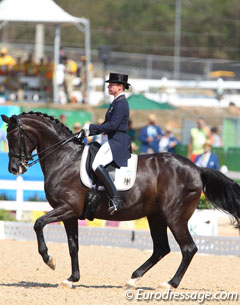 The duo scored 89.071% and placed second. Werth earned her second individual silver medal (her first was on Satchmo at the 2008 Olympics) but it was her 10th Olympic medal, making her the most successful equestrian Olympian in history. At the prize giving ceremony Isabell appeared emotional on the podium, but she denied that she shed tears and joked that it was mainly, "a lot of sweat in my face."
The duo scored 89.071% and placed second. Werth earned her second individual silver medal (her first was on Satchmo at the 2008 Olympics) but it was her 10th Olympic medal, making her the most successful equestrian Olympian in history. At the prize giving ceremony Isabell appeared emotional on the podium, but she denied that she shed tears and joked that it was mainly, "a lot of sweat in my face."
Werth appeared modest when the moderator announced her historic Olympic achievements. "In April I didn't expect to be going to Rio," she explained. "I knew Weihegold for years but we had just 8 months together to grow. We had an important experience in Aachen, then the curve went down. Here I had to take my experience to get her to the top. I knew I wouldn't have the next World Wonder when Charlotte got her 93%. I'm very happy (with silver). We are all happy."
Bröring-Sprehe Bags the Bronze
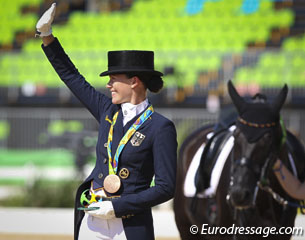 Kristina Bröring-Sprehe has been Dujardin's biggest rival since the ending of the partnership between Helen Langehanenberg and Damon Hill. At the 2015 European Championships, Bröring-Sprehe won silver twice, behind Valegro, and she was on paper Dujardin's toughest competitor.
Kristina Bröring-Sprehe has been Dujardin's biggest rival since the ending of the partnership between Helen Langehanenberg and Damon Hill. At the 2015 European Championships, Bröring-Sprehe won silver twice, behind Valegro, and she was on paper Dujardin's toughest competitor.
At the 2016 Rio Olympics, Kristina and her 15-year old Hanoverian stallion Desperados (by De Niro x Wolkenstein II) were second in the Grand Prix and fourth in the Special, so it was unsure in which position the demure Sprehe would finish. Kristina definitely saved her best ride for last. Her horse was in top shape, really consistent in the head position, up in the bridle and more straight in the body and head. The left snaffle was still a bit too much on, but overall the bridle contact was good. The horse was on the aids and the entire ride was just flawless harmony.
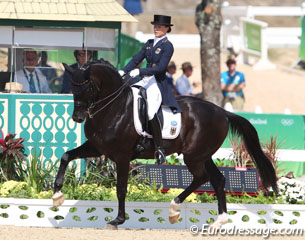 Riding to an original violin arranged music, Sprehe and Desperados showed very fluent half passes, trot extensions, an extended walk with big overtrack but maybe not so ideal in the rhythm. Her combo of collected walk, piaffe turn, extended walk always scores points. The canter half passes were very accurate. There was a minor bobble in the two tempi changes, but the pirouettes were excellent. At the end of the test, the passage lost a bit of regularity but overall their was their best Rio ride by far. They scored 87.142% to finish third. If she were swapped for second place with Werth for third, it certainly would not have been an unjustice!
Riding to an original violin arranged music, Sprehe and Desperados showed very fluent half passes, trot extensions, an extended walk with big overtrack but maybe not so ideal in the rhythm. Her combo of collected walk, piaffe turn, extended walk always scores points. The canter half passes were very accurate. There was a minor bobble in the two tempi changes, but the pirouettes were excellent. At the end of the test, the passage lost a bit of regularity but overall their was their best Rio ride by far. They scored 87.142% to finish third. If she were swapped for second place with Werth for third, it certainly would not have been an unjustice!
At the press conference, Sprehe made it clear that a retirement is not in the cards for Desperados. "He will get a break, maybe a longer one and in the winter he'll be breeding. Then we sit together with Monica to make a new plan for the next show," said Kristina, who had to wait quite a while to know if she won a medal or not. "I was shaking whether it (her score) would be enough, but now I have a medal. It's a fantastic feeling."
Laura Graves Thrilled
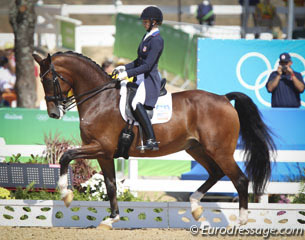 American Laura Graves and her 15-year old Dutch warmblood Verdades (by Florett As) missed out on a podium place, but was still 3% short of bronze. At the 2014 World Equestrian Games Graves rode a quite amateurish sounding ringading freestyle, but for Rio she definitely has upped her game with a more professional production that has the sound of greatness with its filmic tunes. Verdades did not have his A-game with him in the Kur, but the judges were very lenient to give him big scores nonetheless. The beauty of Verdades is that this big, powerful horse can move as if he's barely touching the ground. Graves rides him with a lovely light contact and except for the piaffe all the work is top level.
American Laura Graves and her 15-year old Dutch warmblood Verdades (by Florett As) missed out on a podium place, but was still 3% short of bronze. At the 2014 World Equestrian Games Graves rode a quite amateurish sounding ringading freestyle, but for Rio she definitely has upped her game with a more professional production that has the sound of greatness with its filmic tunes. Verdades did not have his A-game with him in the Kur, but the judges were very lenient to give him big scores nonetheless. The beauty of Verdades is that this big, powerful horse can move as if he's barely touching the ground. Graves rides him with a lovely light contact and except for the piaffe all the work is top level.
In their Rio Kur, however, that "power grace" was not entirely there. The horse appeared a bit flat, was stronger in the contact and even got a bit tight in the throat latch or behind the vertical. The trot half passes were still outstanding: they were steep with good crossing. There was a hesitation in the rhythm in the passage. The extended walk was ok, but Verdades curled himself instead of stretching the nose out, but the massive overtrack was easily achieved. The double pirouettes were super small and had much scope in front. Graves had a very high degree of technical difficult riding flawless two tempi changes on the half circle, followed by ones on the short diagonal. Overall the canter work needed a bit more forward energy. There was a mistake in the rhythm in the final trot extension, but the final centerline was excellent. Graves had ridden well to her music and her floorplan was cleverly drawn as it hardly included any piaffe, which is Verdades weak point at the moment.
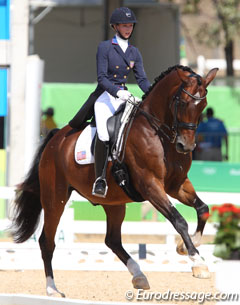 The duo finished fourth with a massive 85.196%. Graves competed in its first Olympic Games and posted personal best scores in the Grand Prix, Special and Freestyle. Mission accomplished.
The duo finished fourth with a massive 85.196%. Graves competed in its first Olympic Games and posted personal best scores in the Grand Prix, Special and Freestyle. Mission accomplished.
“I’m thrilled with the score,” said Graves. “Because Verdades is really honest, the degree of difficulty is something that I can play with and so you have to highlight those moments. We did them twice, showing that it’s not just luck, and the judges obviously rewarded us for it today. I don’t feel like I had quite as much horse as I’ve had over the past couple days. It’s very hot and we’ve been here just over two weeks, so it’s been a long time for us to keep our horses going like this, but he was ready. He stayed really honest, and I couldn’t have asked for more.”
“I’m just so happy,” Graves concluded. “I believe in a system, following a routine, and finding a trainer you trust and staying with them. I’m so blessed that both Robert [Dover] and my personal trainer, Debbie McDonald, have sacrificed so much of their time this summer to be over in Europe with the Team and it really has made a difference.”
Crowd Favourite Severo Jurado Lopez Gets Standing Ovation
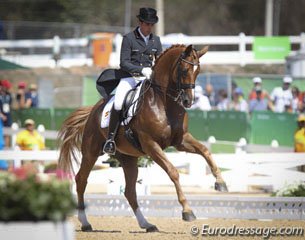 After bringing the crowds to their feet at the 2016 CDIO Aachen in July, Spanish Severo Jurado Lopez and the Danish owned Lorenzo pulled a similar feat in Brazil. Jurado Lopez and Lorenzo are a strapping pair and were the only ones to truly carry the spectators away with their freestyle. The clever alternation of collected movements each time followed by an upbeat burst of energy forwards with extensions, took the audience on a thrilling ride and induced clapping from the crowds as Severo rode the final centerline in passage with one hand.
After bringing the crowds to their feet at the 2016 CDIO Aachen in July, Spanish Severo Jurado Lopez and the Danish owned Lorenzo pulled a similar feat in Brazil. Jurado Lopez and Lorenzo are a strapping pair and were the only ones to truly carry the spectators away with their freestyle. The clever alternation of collected movements each time followed by an upbeat burst of energy forwards with extensions, took the audience on a thrilling ride and induced clapping from the crowds as Severo rode the final centerline in passage with one hand.
The leymen audience of mainly Brazilian rose to their feet like at a soccer match and loud booing ensued when the score of 83.625% (fifth place) followed, but this emotional reaction was only a testimony to the fact that Rio crowds are not as knowledgeable of the sport. There were too many major issues in Severo's ride to rank him any higher and the 83.625% was already a nice present. Lorenzo is a charming horse, ears always forward, but he's too tight in the neck and he always leaves his hindlegs at lunch. In the passage the horse never moves the hindlegs under the body and towards the center of gravity. He has much suspension and airtime, for sure, but the frame is never closed. In the piaffe the side silhouette is pretty, but when you look in front of the horse, you notice how unbalanced he is, heavily swaying and going wide with the frontlegs. There was a hesitation in the rhythm in the first piaffe, in which Lorenzo leaned on the forehand but the rhythm was ok. The collected walk was a bit stiff in the topline but the extended had really good overtrack and relaxation. Jurado Lopez rode a high degree of technical difficulty with tempi changes on the half circle and a double pirouette with a direct transition into a piaffe pirouette in the opposite directoon.
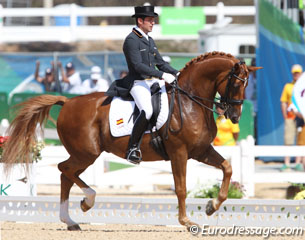 All criticism aside, Jurado Lopez and Lorenzo are fun to watch and they truly show how dressage can ignite passion and emotion from a crowd when the right music is chosen with a good mix of energy. They rode a freestyle that keeps you awake.
All criticism aside, Jurado Lopez and Lorenzo are fun to watch and they truly show how dressage can ignite passion and emotion from a crowd when the right music is chosen with a good mix of energy. They rode a freestyle that keeps you awake.
"It was very special to ride here today," said Jurado Lopez. "It's my first Olympics and my horse is still young. This is fantastic. You always try to do your best, no matter where you are and what you do, but I came her to do my best. But I also know what the others can do , so this is far beyond my expectations. It felt great when the audience began clapping when I rode on the centerline. Yes, the audiene was not so happy with my score, but I will watch the video and analyse my ride."
Dorothee Schneider Misses out on a Great Opportunity
Dorothee Schneider was one of the clear favourites for a kur medal after winning the Kur gold at the 2016 German Championships in Balve. Also in Aachen she proved that Gabriele Kippert's 10-year old Hanoverian Showtime (by Sandro Hit x Rotspon) can dance to music. In Rio Schneider was fourth in the Grand Prix and third in the Special so the opportunity was there for the taking. But it was not meant to be as her freestyle ride got riddled with too many small mistakes.
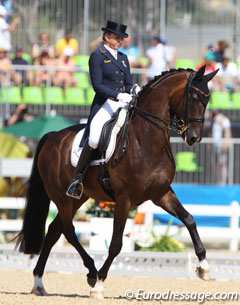 Riding to Queen's The Show Must Go On, Schneider started really strongly with brilliant half passes, a super trot extension, but a hesitant first piaffe in which Showtime lost impulsion. The passage was every elegant and bouncy. The collected walk, piaffe, extended walk combination worked well, even though the piaffe was a bit too forward. Dorothee struggled witht he transition from the right pirouette into a right canter half pass, but the extended canter and two tempi changes were very uphill. The nose needed to be more out in the canter extension though. The one tempi changes had a bobble and lacked some ground cover, yet they were more up than forward. On the final, closing line, Schneider began dropping a few stitches. Showtime skipped a beat in the piaffe pirouette as well as in the piaffe fan and also the end halt was mediocre. It was a great pity as the quality and good riding were certainly there. They still scored 82.946% for 6th place.
Riding to Queen's The Show Must Go On, Schneider started really strongly with brilliant half passes, a super trot extension, but a hesitant first piaffe in which Showtime lost impulsion. The passage was every elegant and bouncy. The collected walk, piaffe, extended walk combination worked well, even though the piaffe was a bit too forward. Dorothee struggled witht he transition from the right pirouette into a right canter half pass, but the extended canter and two tempi changes were very uphill. The nose needed to be more out in the canter extension though. The one tempi changes had a bobble and lacked some ground cover, yet they were more up than forward. On the final, closing line, Schneider began dropping a few stitches. Showtime skipped a beat in the piaffe pirouette as well as in the piaffe fan and also the end halt was mediocre. It was a great pity as the quality and good riding were certainly there. They still scored 82.946% for 6th place.
"It wasn't that good," said a disappointed 47-year old Schneider after the test. "We had a bit loss of power. In the warm up arena Showtime still felt good, but now he has three heavy tests behind him and at the end he ran out of power. That's when the mistakes crept in: in the pirouette, the piaffe and the one tempi changes. It was a bit too much." German team trainer Monica Theodorecsu consoled Schneider and is very excited for Showtime's furutre: "He's a future star. Today was not a tragedy."
Quick Notes on the Other Freestyle Rides
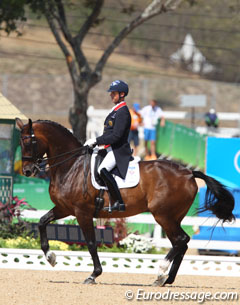 Carl Hester and Jane de la Mare's Dutch warmblood gelding Nip Tuck (by Don Ruto) finished seventh with 82.553%. The long backed and slow bay gelding has a beautiful neck and still makes an impression in the show ring thanks to the skilled riding of Hester. Nip Tuck's freestyle was cleverly arranged with impressive drum music supporting the horse's cadence. Hester began with a piaffe pirouette, passage and then a canter strike off with a double pirouette left. The one tempi changes on the centerline was straight but could have had more ground cover. The piaffe and passage were quite good today although Nip Tuck finds the transitions to passage difficult. The half passes lacked understep and crossing behind and overall the ride needed much more energy and pezzazz, but that is probably quite a lot to ask from this horse.
Carl Hester and Jane de la Mare's Dutch warmblood gelding Nip Tuck (by Don Ruto) finished seventh with 82.553%. The long backed and slow bay gelding has a beautiful neck and still makes an impression in the show ring thanks to the skilled riding of Hester. Nip Tuck's freestyle was cleverly arranged with impressive drum music supporting the horse's cadence. Hester began with a piaffe pirouette, passage and then a canter strike off with a double pirouette left. The one tempi changes on the centerline was straight but could have had more ground cover. The piaffe and passage were quite good today although Nip Tuck finds the transitions to passage difficult. The half passes lacked understep and crossing behind and overall the ride needed much more energy and pezzazz, but that is probably quite a lot to ask from this horse.
“Unbelievable,” Carl told British Dressage, “the fact that that horse’s taken me to where I am now; I’ve had him since he was one and twelve, eleven years later he’s got me here. A top ten finish was my ambition, the horse was wonderful and was at his best."
Swedish Tinne Vilhelmson-Silfven and Antonia Axson Johnson's Hanoverian gelding Don Auriello (by Don Davidoff x White Star) rode a brand new Cees Slings freestyle using the Beach Boys' Good Vibrations as central theme. The dappled dark bay gelding seemed to suffer a bit from the heat as he was not very engaged behind in the piaffe and passage, and trailed the hindlegs quite a lot. The piaffes were still sweet though. The halt at entry was not immobile and the right double pirouette was a bit flat. The one tempi changes were lovely and the one handed pirouette scores points for extra difficulty. There was a break in the final trot extension. Despite these issues the riding was still absolutely lovely with the horse contently chewing the bit. They scored 81.553% for 8th place.
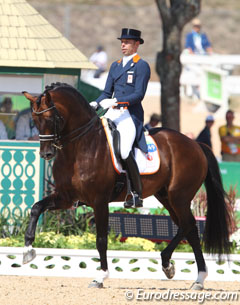 The best performing Dutch rider at the Olympics was Hans Peter Minderhoud on the Glock owned Dutch warmblood stallion Johnson (by Jazz x Flemmingh). Minderhoud had the energy of this horse more controlled in the kur and did not overpace the stallion so much. The piaffe turns were nice, the canter extensions were big, and the two tempi changes were very uphill. The collected walk was tense at the start, and the extended walk did not have sufficient overtrack. The bay gelding is not very happy in the bridle and flashes his tongue on the right side the entire test. He also bopped his head behind the vertical in some of the piaffe and passage work. There was some back stepping in the final piaffe pirouette and the last trot extensions was not 100% pure in the rhythm, but despite these imperfections Minderhoud produced a very nice freestyle to score 80.571% and finish 9th.
The best performing Dutch rider at the Olympics was Hans Peter Minderhoud on the Glock owned Dutch warmblood stallion Johnson (by Jazz x Flemmingh). Minderhoud had the energy of this horse more controlled in the kur and did not overpace the stallion so much. The piaffe turns were nice, the canter extensions were big, and the two tempi changes were very uphill. The collected walk was tense at the start, and the extended walk did not have sufficient overtrack. The bay gelding is not very happy in the bridle and flashes his tongue on the right side the entire test. He also bopped his head behind the vertical in some of the piaffe and passage work. There was some back stepping in the final piaffe pirouette and the last trot extensions was not 100% pure in the rhythm, but despite these imperfections Minderhoud produced a very nice freestyle to score 80.571% and finish 9th.
At last year's European Championships Beatriz Ferrer-Salat and Delgado (by De Niro x Weltmeyer) finished with kur bronze, but the sympathetic Spanish duo could not bring the same level of riding to the table in Rio. While Delgado was still extremely beautiful in the bridle: light, poll up and ears pricked, he struggled with the balance in his very uphill one tempi changes. He sways a lot in them. The rhythm in passage was fantastic though and the drum beats supported the piaffe-passage work very well. The extended walk lacked overtrack. The two tempi changes were brilliant. The horse lost the rhythm in a trot extension and in the right pirouettes there needed to be more bending to the right. Nonetheless Ferrer-Salat and Delgado are an textbook example of wonderful dressage riding. They finished 10th with 80.161%
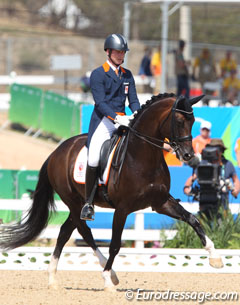 Dutch Diederik van Silfhout seemed to have come to Rio with the expectation that his whopping scores achieved at the Dutch National Championships in July would automatically translate to the Olympic Games. He has unfortunately returned home disappointed. Van Silfhout has openly criticized his scoring in the Dutch press, but does not seem to realize that a new trend has been hitting the dressage scene since 2012. The judges no longer want to see spectacular flash movements, but prefer natural harmony and lightness. This does not mean that Van Silfhout can not produce that. The young rider certainly presents a lovely image in the saddle. He sits dead quiet, his aids are invisible and the bridle contact is so consistent and still. His lovely Arlando (by Paddox) has the nose out at all times and is really good in the contact, but all natural swing and elasticity in the back seems to be absent in this horse. He is certainly a very flashy leg mover. He's super elegant in the passage and lifts the legs well in the piaffe, but he leans a bit on the forehand and does not have this natural swing in those collected movements. He moves like puppet on a string. Also the walk is Arlando's weakest basic gait and one can not play with the big boys if one of three basic gaits is not stellar. These factors are most likely why the judges score they way they score the pair in Rio.
Dutch Diederik van Silfhout seemed to have come to Rio with the expectation that his whopping scores achieved at the Dutch National Championships in July would automatically translate to the Olympic Games. He has unfortunately returned home disappointed. Van Silfhout has openly criticized his scoring in the Dutch press, but does not seem to realize that a new trend has been hitting the dressage scene since 2012. The judges no longer want to see spectacular flash movements, but prefer natural harmony and lightness. This does not mean that Van Silfhout can not produce that. The young rider certainly presents a lovely image in the saddle. He sits dead quiet, his aids are invisible and the bridle contact is so consistent and still. His lovely Arlando (by Paddox) has the nose out at all times and is really good in the contact, but all natural swing and elasticity in the back seems to be absent in this horse. He is certainly a very flashy leg mover. He's super elegant in the passage and lifts the legs well in the piaffe, but he leans a bit on the forehand and does not have this natural swing in those collected movements. He moves like puppet on a string. Also the walk is Arlando's weakest basic gait and one can not play with the big boys if one of three basic gaits is not stellar. These factors are most likely why the judges score they way they score the pair in Rio.
Van Silfhout did ride a lovely freestyle and a score of 79.535% (11th place) should put a smile on any rider's face. His music really supported the tempo variations in his horse and was well done. Van Silfhout began his test strangly: from the halt he just steered his horse to the left and only then picked up the passage. The piaffe in the freestyle was the best the horse had shown in all three tests with a bit more swing on the diagonals. The half passes were lovely, the zig zag well executed, but there was a mistake in the one tempi changes and the horse sways in the hindquarters in them. On the correction line he fixed the one tempi changes but in the final piaffe the horse got wide in front again.
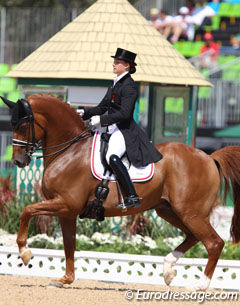 American Steffen Peters and Akiko Yamazaki's Legolas (by Laomedon x Florestan II) were the first pair to go in the freestyle and finished 12th with 79.393%. Peters rode a clear, controlled kur in which the changes were ok, the piaffe passage work strong, despite a hesitation in the piaffe turn. The double pirouette left lacked balance. Peters also rode a strong combination of canter pirouette with a direct transition into a piaffe pirouette.
American Steffen Peters and Akiko Yamazaki's Legolas (by Laomedon x Florestan II) were the first pair to go in the freestyle and finished 12th with 79.393%. Peters rode a clear, controlled kur in which the changes were ok, the piaffe passage work strong, despite a hesitation in the piaffe turn. The double pirouette left lacked balance. Peters also rode a strong combination of canter pirouette with a direct transition into a piaffe pirouette.
Danish Cathrine Dufour and her chestnut Cassidy (by Caprimond x Donnerhall) had a small hesitation in the first double pirouette to the left. The double to the right lacked scope in front. The two tempi changes were nice, the canter extension big, the piaffes were small but rhythmical. Dufour's music was a bit of a mish mash with too many themes going on. She finished her ride with a piaffe fan, but Cassidy would not stand immobile in the final halt. They still scored a very respectable 78.143% to place 13th.
Danish compatrior Anna Kasprzak and her routinier Donnperignon (by Donnerhall x Mozart) have been riding to the same Phil Collins music for years now and it's definitely time for a change. The liver chestnut gelding has wonderful trot extensions and uphill tempi changes, but is always behind the vertical with the nose and needs to be more open in the throat latch. The two tempi changes on the curved line were lovely, there was a double beat in the one tempi changes. The half pass left was the more expressive one. They finished 14th with 76.982%
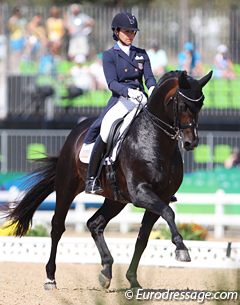 American first-time Olympian Allison Brock, who went from being Sue Blinks' groom to head rider for the Kundrun family, steered the Hanoverian stallion Rosevelt (by Rotspon) to a 15th place with 76.160%. Her music, arranged by Tanghetto, was fun, up tempo with Annie Lennox' Sweet Dreams and canter music from the movie Mr and Mrs Smith. For the trot work the tempo of the music was too fast for the horse though but Brock rode Rosevelt in a good frame with more opening in the throat latch. The extended walk was excellent, the collected walk clear, the trot half passes strong, but in the canter half pass right there was a bit of a miscommunication between rider and horse. One change was short in the two tempi's and the one tempi changes needed more ground cover. In the trot extensions the horse could develop more elasticity in the topline.
American first-time Olympian Allison Brock, who went from being Sue Blinks' groom to head rider for the Kundrun family, steered the Hanoverian stallion Rosevelt (by Rotspon) to a 15th place with 76.160%. Her music, arranged by Tanghetto, was fun, up tempo with Annie Lennox' Sweet Dreams and canter music from the movie Mr and Mrs Smith. For the trot work the tempo of the music was too fast for the horse though but Brock rode Rosevelt in a good frame with more opening in the throat latch. The extended walk was excellent, the collected walk clear, the trot half passes strong, but in the canter half pass right there was a bit of a miscommunication between rider and horse. One change was short in the two tempi's and the one tempi changes needed more ground cover. In the trot extensions the horse could develop more elasticity in the topline.
Swedish Patrik Kittel and Marie Haward's Swedish mare Deja (by Silvano x Don Schufro) had planned on riding a Stevie Wonder freestyle but were not given permission to use Wonder's music at the Olympics, so they had to resort to an older freestyle, which was not as catchy. The pair executed nice half passes, good trot extensions and an uphill canter extensions, but the tempi changes were problematic with the horse not liking to change to the left. There were mistakes in both one tempi lines and rider swung his body heavily in the saddle instead of sitting quiet and balanced in the center. Deja's passage was lovely, but she was unbalanced in the piaffe and got very wide in front. They finished 16th with 76.018%
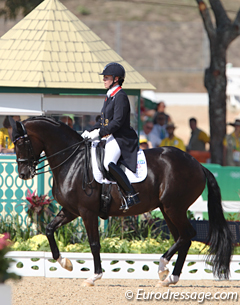 British Fiona Bigwood and her Danish warmblood mare Orthilia (by Gribaldi x Donnerschlag) showed fantastic, perky piaffe and passage in which the regularity is exemplary. There was a break into canter before the left trot half pass and the passage half passes lacked ground cover. In the canter work Orthilia still loses the uphill tendency and dives on the forehand. The extended canter was conservative and the mare broke into canter in the final trot extension. Bigwood's Spanish music was quite non descript, which is pity as her mare is an absolute star on the rise. They scored 76.018% for 17th place.
British Fiona Bigwood and her Danish warmblood mare Orthilia (by Gribaldi x Donnerschlag) showed fantastic, perky piaffe and passage in which the regularity is exemplary. There was a break into canter before the left trot half pass and the passage half passes lacked ground cover. In the canter work Orthilia still loses the uphill tendency and dives on the forehand. The extended canter was conservative and the mare broke into canter in the final trot extension. Bigwood's Spanish music was quite non descript, which is pity as her mare is an absolute star on the rise. They scored 76.018% for 17th place.
Judy Reynolds is the first ever Irish dressage rider to make it the her freestyle finals. Her old coach Anna Merveldt (Judy now trains with Johann Hinnemann) was the first to ever ride and individual finals. Merveldt did it at the 1992 Olympic Games in Barcelona, when the finals were held in the Grand Prix Special. In Rio Reynolds and her Dutch warmblood gelding Vancouver K (by Jazz x Ferro) were very strong in the piaffe, passage and canter work. The two tempi changes were super straight, the ones needed more ground cover. In the trot extensions the overtrack was there, but they were a bit flat. The extended walk have two hooves overstep but appeared a bit hurried. While Reynolds keeps a quiet contact, Vancouver was not entirely relaxed in the mouth today with a tense his upper lip. The horse switched leads in the left double pirouette, which cost the pair valuable points. They were 18th with 75.696%
Text and photos © Astrid Appels - No reproduction allowed
Related Links
Eurodressage Coverage of the 2016 Olympic Games